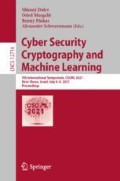Abstract
In a public-key threshold encryption scheme, the sender produces a single ciphertext, and any \(t+1\) out of \(n\) intended recipients can combine their partial decryptions to obtain the plaintext. Ad hoc threshold encryption (ATE) schemes require no correlated setup, enabling each party to simply generate its own key pair. In this paper, we initiate a systematic study of the possibilities and limitations of ad-hoc threshold encryption, and introduce a key application to scalable multiparty computation (MPC).
Assuming indistinguishability obfuscation (iO), we construct the first ATE that is sender-compact—that is, with ciphertext length independent of \(n\). This allows for succinct communication once public keys have been shared. We also show a basic lower bound on the extent of key sharing: every sender-compact scheme requires that recipients of a message know the public keys of other recipients in order to decrypt.
We then demonstrate that threshold encryption that is ad hoc and homomorphic can be used to build efficient large-scale fault-tolerant multiparty computation (MPC) on a minimal (star) communication graph. We explore several homomorphic schemes, in particular obtaining one iO-based ATE scheme that is both sender-compact and homomorphic: each recipient can derive what they need for evaluation from a single short ciphertext. In the resulting MPC protocol, once the public keys have been distributed, all parties in the graph except for the central server send and receive only short messages, whose size is independent of the number of participants.
Taken together, our results chart new possibilities for threshold encryption and raise intriguing open questions.
L. Reyzin—Supported in part by NSF grant 1422965.
A. Smith—Supported in part by NSF awards IIS-1447700 and AF-1763786 and a Sloan Foundation Research Award.
S. Yakoubov—Work done while at Boston University, and was supported in part by NSF grant 1422965.
Access this chapter
Tax calculation will be finalised at checkout
Purchases are for personal use only
Notes
- 1.
A “horcrux” is a piece of one’s soul stored in an external object, according to the fantasy series Harry Potter [20].
- 2.
References
Ananth, P., Boneh, D., Garg, S., Sahai, A., Zhandry, M.: Differing-inputs obfuscation and applications. Cryptol. ePrint Arch. Rep. 2013, 689 (2013). http://eprint.iacr.org/2013/689
Badrinarayanan, S., Jain, A., Manohar, N., Sahai, A.: Secure MPC: laziness leads to GOD. In: Moriai, S., Wang, H. (eds.) ASIACRYPT 2020. LNCS, vol. 12493, pp. 120–150. Springer, Cham (2020). https://doi.org/10.1007/978-3-030-64840-4_5
Barak, B., et al.: On the (Im)possibility of obfuscating programs. In: Kilian, J. (ed.) CRYPTO 2001. LNCS, vol. 2139, pp. 1–18. Springer, Heidelberg (2001). https://doi.org/10.1007/3-540-44647-8_1
Bell, J., Bonawitz, K.A., Gascón, A., Lepoint, T., Raykova, M.: Secure single-server aggregation with (poly)logarithmic overhead. Cryptol. ePrint Archive Rep. 2020, 704 (2020). https://eprint.iacr.org/2020/704
Bonawitz, K., et al.: Practical secure aggregation for privacy-preserving machine learning. In: Thuraisingham, B.M., Evans, D., Malkin, T., Xu, D. (eds.) ACM CCS 2017, pp. 1175–1191. ACM Press, New York (2017)
Boneh, D., et al.: Threshold cryptosystems from threshold fully homomorphic encryption. In: Shacham, H., Boldyreva, A. (eds.) CRYPTO 2018. LNCS, vol. 10991, pp. 565–596. Springer, Cham (2018). https://doi.org/10.1007/978-3-319-96884-1_19
Boneh, D., Zhandry, M.: Multiparty key exchange, efficient traitor tracing, and more from indistinguishability obfuscation. In: Garay, J.A., Gennaro, R. (eds.) CRYPTO 2014. LNCS, vol. 8616, pp. 480–499. Springer, Heidelberg (2014). https://doi.org/10.1007/978-3-662-44371-2_27
Boyle, E., Gilboa, N., Ishai, Y.: Breaking the circuit size barrier for secure computation under DDH. In: Robshaw, M., Katz, J. (eds.) CRYPTO 2016. LNCS, vol. 9814, pp. 509–539. Springer, Heidelberg (2016). https://doi.org/10.1007/978-3-662-53018-4_19
Boyle, E., Gilboa, N., Ishai, Y., Lin, H., Tessaro, S.: Foundations of homomorphic secret sharing. In: Karlin, A.R., (eds.), ITCS 2018, vol. 94, pp. 21:1–21:21. LIPIcs (Jan 2018)
Daza, V., Herranz, J., Morillo, P., Ràfols, C.: CCA2-secure threshold broadcast encryption with shorter ciphertexts. In: Susilo, W., Liu, J.K., Mu, Y. (eds.) ProvSec 2007. LNCS, vol. 4784, pp. 35–50. Springer, Heidelberg (2007). https://doi.org/10.1007/978-3-540-75670-5_3
Daza, V., Herranz, J., Morillo, P., Ràfols, C.: Ad-hoc threshold broadcast encryption with shorter ciphertexts. Electr. Notes Theor. Comput. Sci. 192(2), 3–15 (2008)
Delerablée, C., Pointcheval, D.: Dynamic threshold public-key encryption. In: Wagner, D. (ed.) CRYPTO 2008. LNCS, vol. 5157, pp. 317–334. Springer, Heidelberg (2008). https://doi.org/10.1007/978-3-540-85174-5_18
Desmedt, Y., Frankel, Y.: Threshold cryptosystems. In: Brassard, G. (ed.) CRYPTO 1989. LNCS, vol. 435, pp. 307–315. Springer, New York (1990). https://doi.org/10.1007/0-387-34805-0_28
Dodis, Y., Halevi, S., Rothblum, R.D., Wichs, D.: Spooky encryption and its applications. In: Robshaw, M., Katz, J. (eds.) CRYPTO 2016. LNCS, vol. 9816, pp. 93–122. Springer, Heidelberg (2016). https://doi.org/10.1007/978-3-662-53015-3_4
ElGamal, T.: A public key cryptosystem and a signature scheme based on discrete logarithms. In: Blakley, G.R., Chaum, D. (eds.) CRYPTO’84. LNCS, vol. 196, pp. 10–18. Springer, Heidelberg (1984)
Chaum, D. (ed.): Towards Trustworthy Elections. LNCS, vol. 6000. Springer, Heidelberg (2010). https://doi.org/10.1007/978-3-642-12980-3
Hirt, M., Sako, K.: Efficient receipt-free voting based on homomorphic encryption. In: Preneel, B. (ed.) EUROCRYPT 2000. LNCS, vol. 1807, pp. 539–556. Springer, Heidelberg (2000). https://doi.org/10.1007/3-540-45539-6_38
Jain, A., Rasmussen, P.M.R., Sahai, A.: Threshold fully homomorphic encryption. Cryptol. ePrint Arch. Rep. 2017, 257 (2017). http://eprint.iacr.org/2017/257
Mukherjee, P., Wichs, D.: Two round multiparty computation via multi-key FHE. In: Fischlin, M., Coron, J.-S. (eds.) EUROCRYPT 2016. LNCS, vol. 9666, pp. 735–763. Springer, Heidelberg (2016). https://doi.org/10.1007/978-3-662-49896-5_26
Rowling, J.: Harry Potter and the Half-Blood Prince. Bloomsbury (2005)
Zhandry, M.: How to avoid obfuscation using witness PRFs. In: Kushilevitz, E., Malkin, T. (eds.) TCC 2016. LNCS, vol. 9563, pp. 421–448. Springer, Heidelberg (2016). https://doi.org/10.1007/978-3-662-49099-0_16
Acknowledgements
We would like to thank Ran Canetti and Ben Kreuter for helpful discussions.
Author information
Authors and Affiliations
Corresponding author
Editor information
Editors and Affiliations
Rights and permissions
Copyright information
© 2021 Springer Nature Switzerland AG
About this paper
Cite this paper
Reyzin, L., Smith, A., Yakoubov, S. (2021). Turning HATE into LOVE: Compact Homomorphic Ad Hoc Threshold Encryption for Scalable MPC. In: Dolev, S., Margalit, O., Pinkas, B., Schwarzmann, A. (eds) Cyber Security Cryptography and Machine Learning. CSCML 2021. Lecture Notes in Computer Science(), vol 12716. Springer, Cham. https://doi.org/10.1007/978-3-030-78086-9_27
Download citation
DOI: https://doi.org/10.1007/978-3-030-78086-9_27
Published:
Publisher Name: Springer, Cham
Print ISBN: 978-3-030-78085-2
Online ISBN: 978-3-030-78086-9
eBook Packages: Computer ScienceComputer Science (R0)

